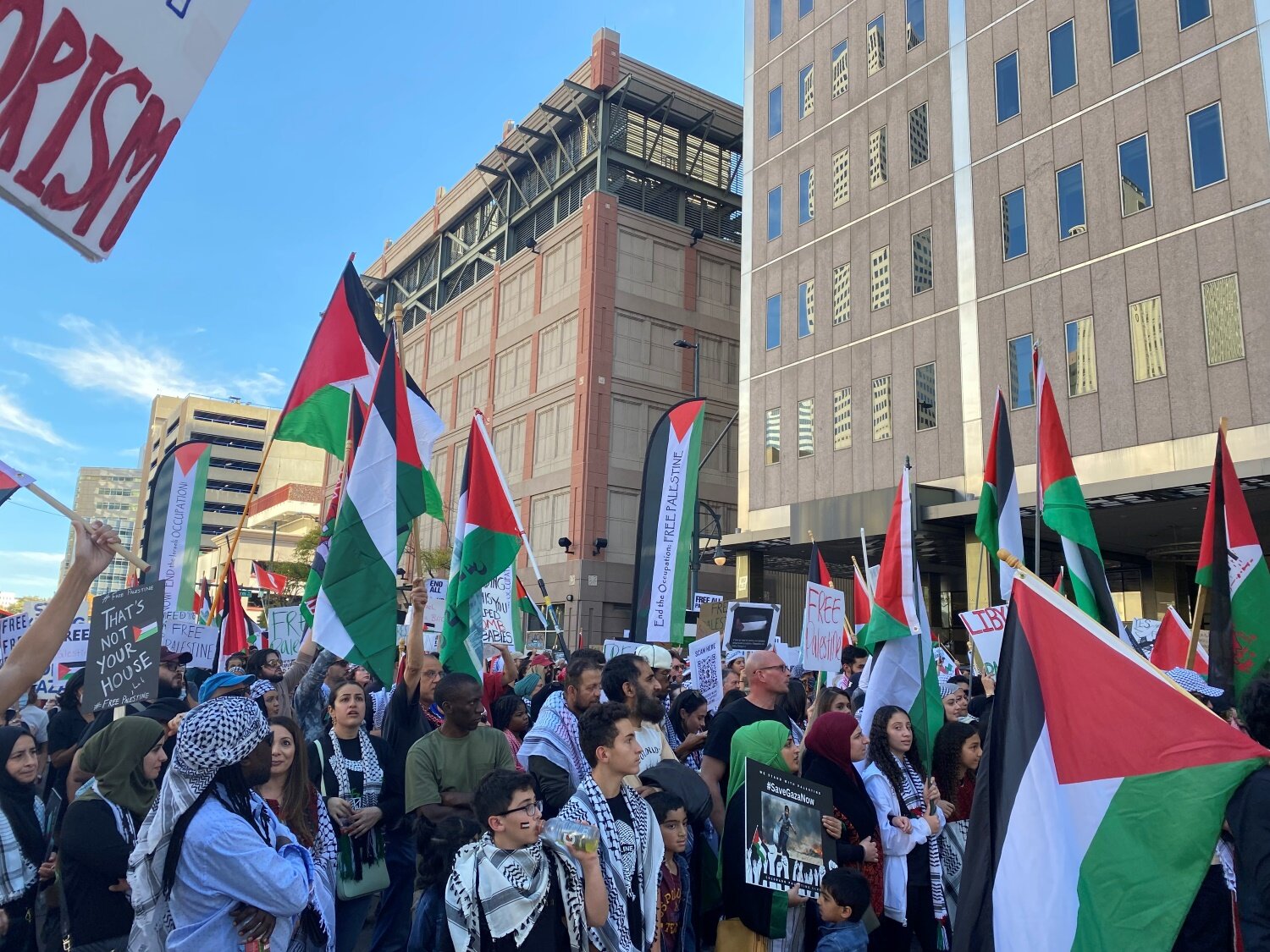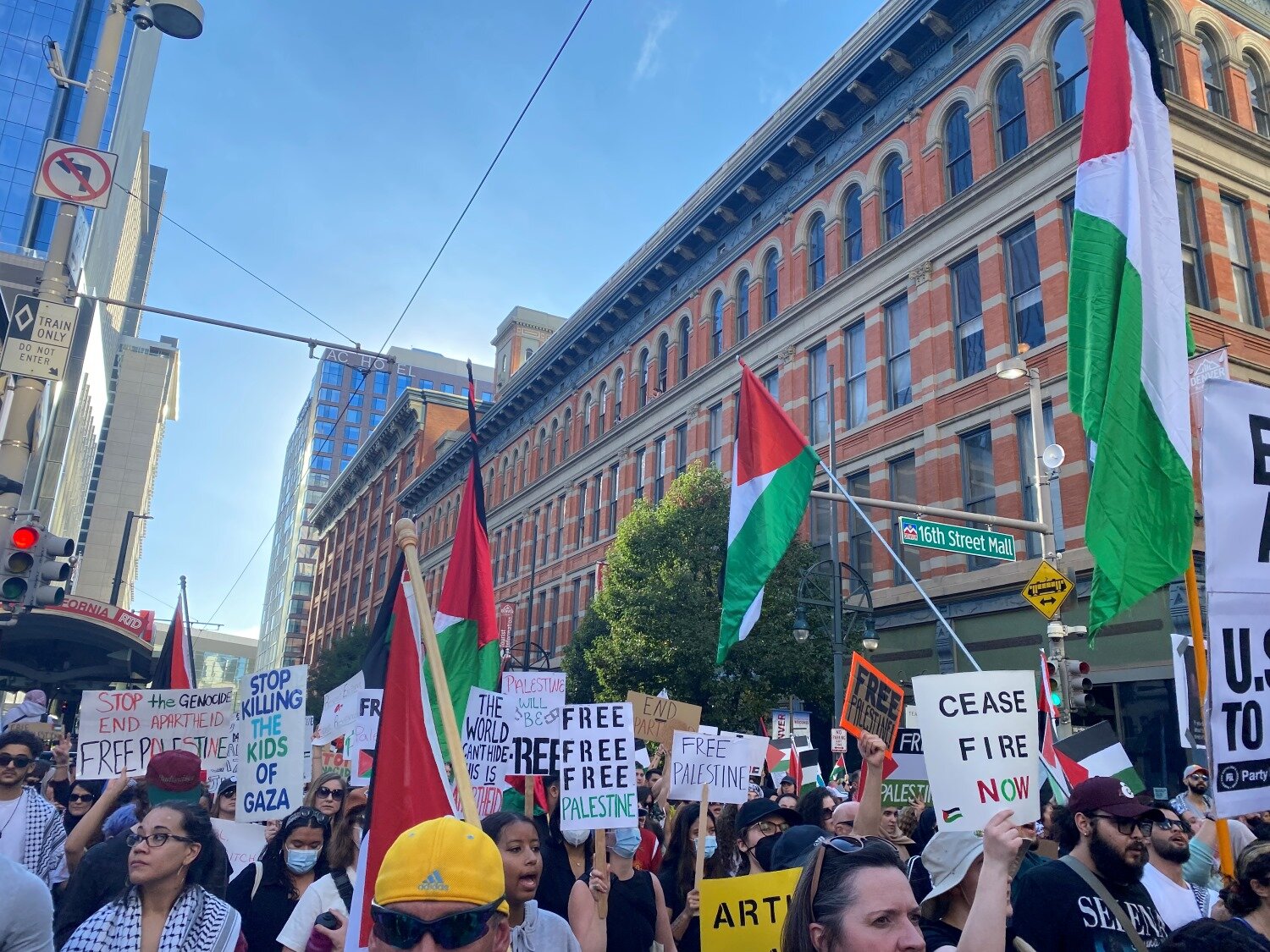From Denver, protesters call for cease-fire in Israel-Hamas war

teandDENVER — Nadia Hammad wakes up every day prepared for the worst.
Hammad said 47 of her family members have been killed by Israeli bombing in Gaza, with 12 dying in one night. She spends most of her days communicating with her family and using on-the-ground news reports of “safe” areas to tell them where to seek shelter.
“It’s terrifying,” said Hammad, who grew up in Gaza and lives in Denver. “We’re getting these goodbye messages and that’s it. That’s the end.”
Hundreds of people protested outside the Colorado Capitol and marched through the streets of Downtown Denver Saturday calling for a cease-fire in the ongoing conflict between Israel and Hamas, an Islamic militant movement that is also one of the Palestinian territories’ two major political parties. Hamas launched multiple attacks on Israel October 7, leaving more than 1,400 people dead. Israeli authorities also reported that 203 people, including children, had been taken hostage. The United States and European Union have identified Hamas as a "terrorist organization."
Almost immediately after Hamas’ attack, Israel began dropping airstrikes into Gaza, with aid from the United States. In a national address last week, President Joe Biden requested $14.3 billion in aid to the Israeli military.
In what the United Nations called “international human rights violations,” Israeli officials cut off access to water and electricity in Gaza. International news outlet Al Jazeera reported several entire neighborhoods, including hospitals, schools, and places of worship, have been destroyed by Israel’s bombing campaign. ABC News reports at least 3,400 people have been killed in Gaza, according to the Palestinian Health Authority.
Protest organizers in Denver encouraged participants to call their federal representatives and plead for the United States to stop funding the Israeli military.
“These people are suffering and they’re terrified,” Hammad said. “They just want a cease-fire, they just want it to end and they want our help to end it.”

Palestinian flags flew high Saturday as people marched around the Colorado Capitol and 16th Street Mall showing their support for a cease-fire in Gaza. (Alison Berg/Rocky Mountain PBS)
Though they stopped short of calling for a cease-fire, 55 House Democrats sent a letter to President Biden earlier this month in which they expressed their concern over the "humanitarian situation in Gaza." None of Colorado's representatives signed the letter.
As they reached 16th Street Mall Saturday, protesters chanted “while you’re shopping, bombs are dropping.” A few mall employees watched from inside stores. Some came to join the protest. Most shoppers ignored the crowd.
“Future generations will look back at everyone who sat back and did nothing or vilified and ask ‘where was your humanity,’” said Meera Alul, a Denver resident with family in the Palestinian territories.
Alul grew up in Dubai but frequently visited family on the West Bank, an occupied territory of Israel west of the Jordan River.
“How much do we have to do and see before we realize that this is a true genocide?” Alul asked. “It’s a humanitarian crisis, and we can’t just sit idly by and watch it unfold.”
Israel was created following the British Mandate of Palestine, which the League of Nations adopted in 1922 with the intention of establishing a Jewish state. At that time, an estimated 70,000 European Jews immigrated to Palestine, then home to about 1.2 million Arabs.
Following the Holocaust, more Jewish Europeans immigrated to the state and, today, about 73% of Israel’s population is Jewish. Palestinians refer to the expulsion of 700,000 Palestinian Arabs in 1948 after the establishment of the State of Israel as the “Nakba,” meaning “catastrophe.”
Since Israel’s founding, there have been eight significant wars between Israel and Palestinian forces. In 1967, Israel captured control over the Gaza Strip, a 25-mile strip of land along the Mediterranean Sea, which borders Egypt and is home to 2.1 million Palestinians. Gaza is sealed by fences and is described by human rights groups as “Israel’s open-air prison.” Gaza is one of the most densely-populated places in the world.
Alul said visiting her family there often felt like visiting another world, as most lived in extreme poverty and had difficulty leaving the area.
“All of the destruction and racism was just rampant,” Alul said. “This is not just something that’s happened over the last few weeks. This has been happening for literal decades if not more.”

Incidents of antisemitism were on the rise before the conflict, increasing by 37% around the world between 2021 and 2022, according to a study from Tel Aviv University and the Anti-Defamation League. Following Hamas' attack in Israel, a Chicago landlord killed a six-year-old Palestinian boy, Wadea al-Fayoum, because the boy was Muslim, authorities said. The rise in violence against both communities spurred many Jewish people to protest with signs that said “Jews for Palestinian liberation” and “Jews support Palestine.”
[Related: How Muslim and Jewish faith groups are coming together during Israel-Hamas war]
“Conflating support of Israel’s illegal occupation with anything having to do with Jewish values is a dangerous and violent conflation of Israel’s criminal government with global Jews,” said Joel Greenberg, a Jewish man who attended the protest.
“I think it’s a Jewish value to value all life, and in this moment we need to focus on threats of obliteration of Gaza,” Greenberg said.
“We’re demanding that the American government choose peace over war, choose cease-fire over funding another infinite war and choose to no longer fund Israel’s illegal occupation of Palestine and their land and their autonomy.”
More than 80% of Americans support Israel, according to a Harvard CAPS-Harris poll, but younger generations polled had more sympathy for Palestinians. Alul said asking politicians for help has rarely worked in the past, but she’s hopeful that taking to the streets and shifting public perspectives will help save lives.
“No more hate,” Alul said. “No more fear.”
Alison Berg is a reporter at Rocky Mountain PBS. You can reach Alison at alisonberg@rmpbs.org.
Oct. 24, 2023 update: This article was updated in order to follow the Associated Press Stylebook's guidance for references to the Palestinian territories.
